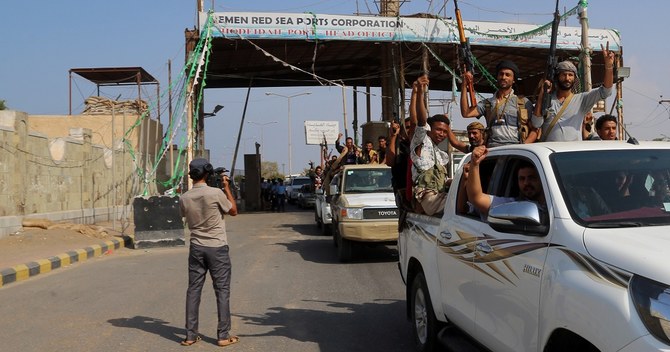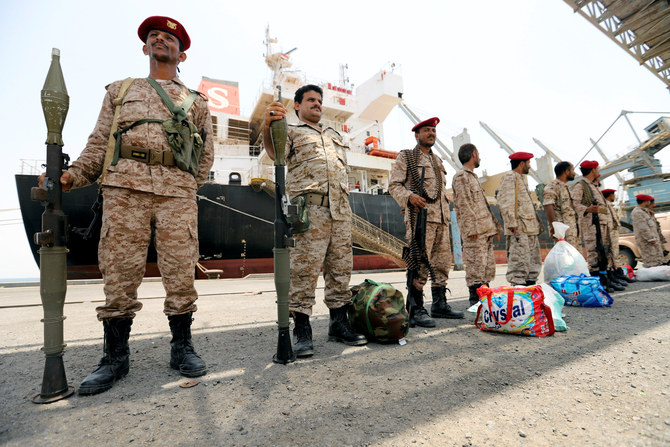HODEIDAH: Houthi militia on Saturday started withdrawing forces from Saleef port in Hodeidah under a UN-sponsored deal stalled for months, a Reuters witness said, reviving hopes for peace efforts to end the four-year war.
But a minister in the Yemeni government backed by Saudi Arabia dismissed the Iranian-backed Houthis' pullout as a "show" meant to "misinform the international community".
The move is the first major step in implementing the pact reached last year by the government and the Houthis for a truce and troop withdrawal in Hodeidah, a lifeline for millions of Yemenis.
UN teams were overseeing the Houthi redeployment in Saleef, used for grain, as other teams headed to the second port of Ras Isa, used for oil, to start implementing the withdrawal from there, according to the witness.
A dozen trucks carrying Houthi fighters, armed with rocket-propelled grenade launchers and machine guns, departed from Saleef. Two ships were docked at the port and operations were running normally, said the witness who was at the facility.
"The coast guards have taken over in Saleef," he said. "They and UN officials have started checking equipment at the port."
The Houthis said their "unilateral step shows our commitment to implement the Hodeidah agreement and to achieving peace," after four years of fighting in the Arab nation.
However, Yemeni Information Minister Muammar Al-Iryani told Reuters the pullout was "a flagrant show".
"It's an attempt to misinform the international community ahead of a meeting of the UN Security Council" on Yemen, he said. "A group of (Houthi) militiamen left and they were replaced by others wearing coast guard police uniforms."
The UN Redeployment Coordination Committee (RCC) has said the Houthis would make an "initial unilateral redeployment" from the ports between May 11 and May 14.
It said the redeployment would enable the United Nations to take a leading role in supporting the local Red Sea Ports Authority in managing the ports and enhance UN checks on cargoes. It would also allow humanitarian corridors to be reopened.
The first day of a withdrawal of forces by the Houthis from three of Yemen's Red Sea ports went "in accordance with established plans", the head of the UN mission to monitor the deal said on Sunday.
"All three ports were monitored simultaneously by United Nations teams as the military forces left the ports and the Coast Guard took over responsibility for security," Lt. Gen. Michael Lollesgaard, head of the UN's Redeployment Coordination Committee (RCC), said in a statement.
The UN also said that the government of Yemen will deliver their part of phase one of the withdrawal plan “when requested” to do so.
There has been no comment so far from the Arab coalition that has massed forces outside Houthi-held Hodeidah, which handles the bulk of Yemen's imports and aid supplies.
Western allies, which supply arms and intelligence to the coalition, have pushed for an end to the war.
Hodeidah became the focus of the war last year when the coalition twice tried to seize its port to cut off the main supply line of the Houthis, whom they accuse of smuggling Iranian weapons, including missiles that have targeted Saudi cities. The Houthis and Tehran deny the accusations.
It was not clear if UN special envoy Martin Griffiths had secured agreement between the two sides over the main sticking point regarding which local authorities would control the ports and city under UN supervision after both sides withdraw.
The coalition had disputed an earlier unilateral withdrawal by the Houthis from Hodeidah port in December, saying they had handed it over to coast guard members loyal to the group.
A UN source told Reuters on Saturday that the RCC would announce its assessment of the Houthi redeployment next week.
Under the first phase, the Houthis would pull back five km (three miles) from the ports over the next four days. Coalition forces, currently massed four kilometers from Hodeidah port on the edges of the city, would retreat one km from "Kilo 8" and Saleh districts.
In the second phase, both sides would pull troops 18 km outside the city and heavy weapons 30 km away.
The UN secured the Hodeidah deal at peace talks in Sweden, the first in two years, to avert a full-scale assault on the port that risked triggering mass famine.
The pact is also a trust-building step to pave the way for wider political negotiations to end the conflict.
The alliance led by Saudi Arabia intervened in Yemen in 2015 after the Houthis ousted the internationally recognised government of Abd-Rabbu Mansour Hadi.
The ceasefire in Hodeidah has largely held but the fighting escalated elsewhere in Yemen.



























